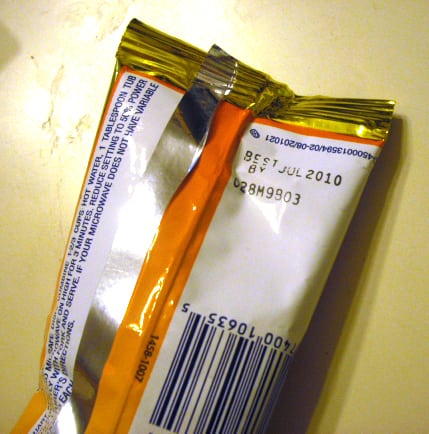Have you ever wondered what the dates on your food mean?

“Sell by July 31” or “Use by October 19, 2010”?
I’ve seen articles on this before, and appreciated the info, so I’m going to pass some of this along…
Dating on non-perishable food
According to the USDA, most of the dates on food sold at stores in the USA are not related to safety. They are used to help the stores determine how long to display the product, and for consumers they are used to indicate the ‘best quality’ deadline.
The USDA’s recommendation for products marked with a “use-by” date, is to follow that as a guideline. (I’ve also read that the use-by date is a safety date, but the USDA specifically says its not.)
Dating products is only required on infant formula and some baby products, it’s not required on normal pantry items. That said, Kraft, Pillsbury and the like don’t want you to buy or use one of their products and be disappointed, so the ‘best if used by’ dates make sense from a quality control standpoint. It’s sort of shocking in this day and age that there isn’t a requirement for a safety date on pantry items. Some states do mandate expiration dates on eggs.
If, however, you’re pinching pennies, most of those products are perfectly safe to use. I will say, from my own experience, you don’t want to eat peanut butter that’s too far past it’s “best by” date… EW! Won’t hurt you, but it doesn’t taste good either. Ditto for mayonnaise.
When it comes to baking mixes, the biggest issue when using one past it’s “best by” date, is that the leavening is likely to be kaput. For most cake mixes, muffin mixes, etc., you can safely add a teaspoon of baking powder without altering the flavor and you’re good to go.
Older foods, particular those with oils in them can develop an ‘off’ odor or flavor when kept too long. Most oils will go rancid given enough time. The more refined they are, the longer they last. That means that shortening or vegetable oil will last a lot longer than lard. You will be able to smell it if your oil/fat has gone rancid, it’s a pretty distinct odor.
If the packaging (can, box, etc.) has been compromised, and especially if a can is bulging or seeping... THROW IT OUT! Don’t ever risk your health on such in inexpensive item. (Most canned goods cost less than a buck or two.)
For more information about shelf-life and product dating, please visit: http://www.fsis.usda.gov/factsheets/food_product_dating/index.asp